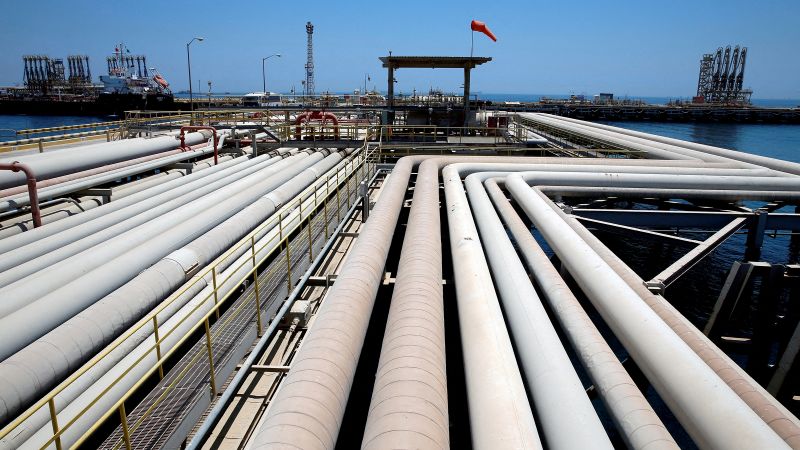
America’s economy is about to get a war shock: Surging oil prices
How did your country report this? Share your view in the comments.
Diverging Reports Breakdown
America’s economy faces a new war shock: Surging oil prices
Oil prices are expected to rise by about $5 per barrel when markets open Sunday night. US oil hasn’t closed above $80 a barrel since January and has largely hovered between $60 and $75 since August 2024. The direction oil prices take is likely to depend on whether Iran’s parliament decides to block the Strait of Hormuz, a key trade route that accounts for about 20% of the world’s crude oil. If the strait is closed, the price of oil could rise to $100 a barrel, which would raise gas and diesel prices by about 75 cents per gallon from recent levels. US trade policies combined with the Israel-Iran conflict “strongly suggest inflation will be moving faster and higher over the next 90 days,” according to Joe Brusuelas, chief economist for the accounting firm RSM.
The American economy faces the unwelcome prospect of reignited inflation after the United States launched strikes on three nuclear facilities in Iran.
High oil and gas prices are a near certainty, experts say. The big question now: How long will the fossil fuels price spike last?
Oil prices are expected to rise by about $5 per barrel when markets open Sunday night, according to experts.
“We are looking at $80 oil on the open,” said Andy Lipow of Lipow Oil Associates. US oil hasn’t closed above $80 a barrel since January and has largely hovered between $60 and $75 a barrel since August 2024.
Relatively tame oil prices have lowered gas prices to below $3 a gallon in many parts of the country, a major source of price relief for inflation-weary consumers.
It’s unclear if any major spike in oil prices will be sustained for a long period. Oil prices have risen about 10% since Israel’s surprise attack on June 13 and then fell on Friday after US President Donald Trump announced a two-week deadline on whether to strike Iran.
“One shouldn’t necessarily assume that just because the price of oil goes up, it’s going to stay there. It doesn’t,” said Joe Brusuelas, chief economist for the accounting firm RSM.
The direction oil prices take is likely to depend on whether Iran’s parliament decides to block the Strait of Hormuz, a key trade route that accounts for about 20% of the world’s crude oil.
On Sunday, Iran’s Foreign Minister Abbas Araghchi said his country has “a variety of options” when deciding how to respond to the US attacks and a prominent adviser to Iran’s supreme leader has already called for the closure of the Strait of Hormuz.
Bob McNally, president of consulting firm Rapidan Energy Group and former energy adviser to President George W. Bush, said that should Iran cut off the world’s oil supply by closing the strait it would risk more military force from the United States and its allies. Iran could also attack infrastructure in the Persian Gulf that treats and exports oil and gas.
“It’s possible they will decide the only thing that can dissuade President Trump is the fear of an oil price spike,” he said. “They have to actually create that fear.”
Appearing Sunday on Fox News, Secretary of State Marco Rubio called on China to prevent Iran from closing the Strait of Hormuz, adding that closing it would do more damage to other economies than the US economy. China buys a third of all oil that comes from the Persian Gulf, while the United States buys less than 3%.
“I encourage the Chinese government in Beijing to call them about that, because they heavily depend on the Straits of Hormuz for their oil,” Rubio said.
Rubio added that closing the strait would hurt other countries’ economies more than the US economy.
Meanwhile, American consumers may soon feel a price shock at the pump.
“It takes five days or so for stations to pass along the prices they see in one day. If oil markets do surge today and then tomorrow, it could start showing up at the pump in a matter of hours,” said Patrick De Haan, vice president of petroleum analysis at GasBuddy, a fuel tracking platform.
According to Lipow, should the Strait of Hormuz be affected, the price of oil could rise to $100 a barrel, which would raise gas and diesel prices by about 75 cents per gallon from recent levels.
Meanwhile, US trade policies combined with the Israel-Iran conflict “strongly suggest inflation will be moving faster and higher over the next 90 days,” according to Brusuelas. Many mainstream economists argue that the low inflation of the spring represents a calm before the summer storm, when they expect prices to rise because of Trump’s tariffs.
Source: https://www.cnn.com/2025/06/22/business/oil-prices-iran-strikes
